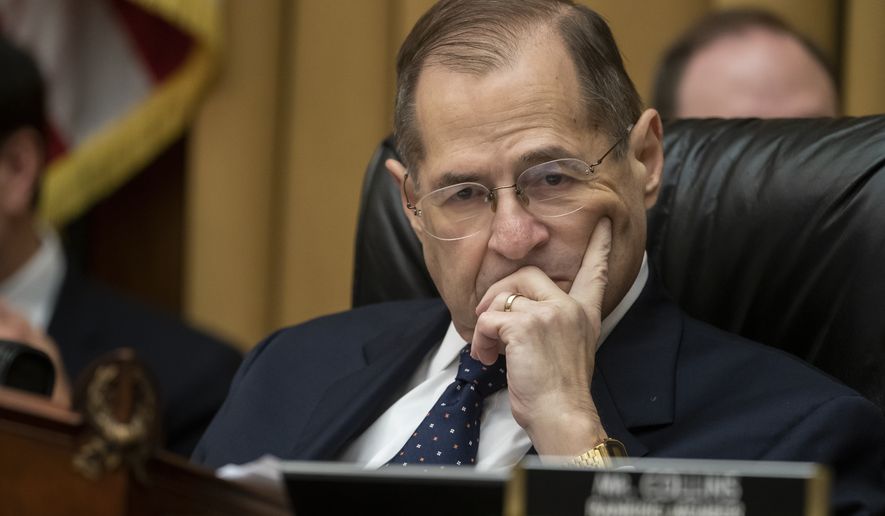House Judiciary Committee Chairman Jerrold Nadler on Tuesday proposed slashing the budget for Attorney General William Barr by $50 million to punish him for failing to find time to testify on his department’s activities.
Mr. Barr is at the center of a number of major flare-ups between the Trump administration and congressional Democrats, and Mr. Nadler and his colleagues have been eager to bring him to Capitol Hill for a public grilling.
But after a March date fell through because of coronavirus pandemic, they have been unable to reach a new agreement, and Mr. Nadler said he will take steps to try to force the issue.
The New York Democrat said he would introduce legislation this week to cut the budget for Mr. Barr’s personal office, although the measure is unlikely to pass the Republican-controlled Senate.
Mr. Nadler also said his committee will hear testimony from Justice Department whistleblowers and former officials who can “describe specific incidents of misconduct as well as the unprecedented politicization” of the department under the Trump administration.
That hearing has not been scheduled nor has Mr. Nadler identified potential witnesses.
The Judiciary Committee also will file a brief with the U.S. Court of Appeals for the D.C. Circuit opposing the Justice Department’s request to dismiss the charges against former national security adviser Michael Flynn, who pleaded guilty to lying to the FBI.
Mr. Nadler said the Flynn matter is “one of many cases in which Attorney General Barr has improperly interfered for the benefit of President Trump and his political allies.”
A Justice Department spokesman said the White House issued guidance this last week restricting cabinet-level officials from participating in congressional hearings in June, because of the coronavirus crisis.
The spokesperson added that the department would be pleased to reschedule Mr. Barr’s appearance after the temporary ban on congressional hearings expires next month.
The actions outlined Tuesday were better options than trying to compel Mr. Barr’s testimony through a subpoena and winding up with a protracted legal battle, Mr. Nadler said.
“I am not going to spend months litigating a subpoena with an attorney general who has already spent years resisting the courts and legitimate congressional oversight — but neither will we stand by and allow Mr. Barr to continue to corrupt the department,” he said. “We do not take these actions lightly or with any sense of joy. We have both a duty and a moral obligation to protect the rule of law in our country, and we intend to do just that.”
Tuesday’s clash is the latest example of bad blood between the nation’s top cop and the chairman of the panel that oversees the Justice Department.
Mr. Barr was scheduled to testify in May 2019, amid questions about special counsel Robert Mueller’s report on Russian interference in the 2016 elections. But the attorney general refused to show up after Democrats insisted committee lawyers would ask the questions.
Another hearing was scheduled for March but canceled by both sides because of coronavirus restrictions.
Mr. Nadler said he wanted to hear from Mr. Barr on June 9, but the Justice Department said last week that the attorney general could not attend. Instead, the department offered the testimony of Deputy Attorney General Jeffrey Rosen.
That left Mr. Nadler fuming, citing Mr. Barr’s presence at a photo op with President Trump on Monday in response to the protests over George Floyd’s death in police custody.
“He told the committee that he could not find the time to testify because of that epidemic — but took the time to tour the peaceful protests at Lafayette Park just minutes before riot police fired tear gas into the crowd,” Mr. Nadler said in a statement.
Democrats say they’re still pursuing questions about Mr. Mueller’s report and also want to ask Mr. Barr about the Justice Department’s intervention in the cases against Flynn and Roger Stone, another Trump ally.
Democrats also are likely to want to question Mr. Barr about Mr. Trump’s effort to declare Antifa a domestic terror group, the Bureau of Prisons’ handling of the coronavirus, and issues of racial bias in policing.
• Jeff Mordock can be reached at jmordock@washingtontimes.com.




Please read our comment policy before commenting.